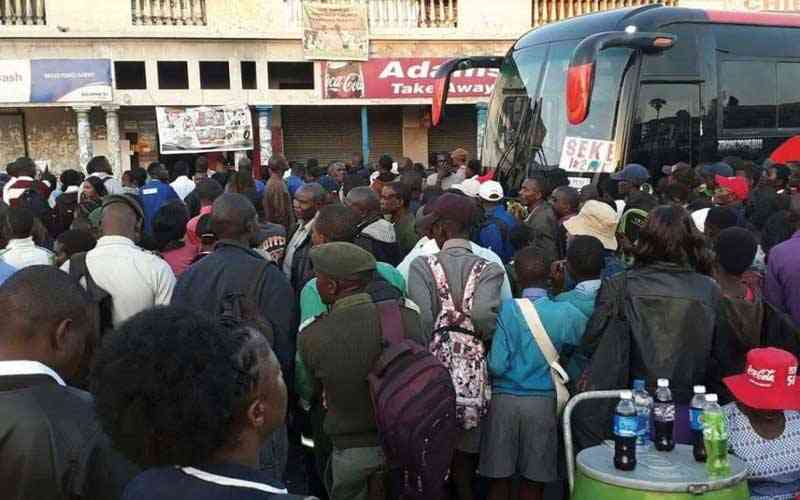
BRIAN Potera, a resident of Chitungwiza, is always in a state of bother in the morning.
As the commuter omnibus transporting him from Zengeza passes Maruta Shopping Centre in Hatfield, he knows it is the beginning of a stressfu dayl.
The presence of police at the intersection of Glenara Drive and Seke Road in Harare, sends a chilling feeling down his spine, he says.
In the past two months, the intersection, about three kilometres south of the central business district (CBD), has been turned into an informal drop-off zone for commuters.
Commuter omnibus drivers cannot risk proceeding beyond this point.
Those operating illegal taxis, known in street lingo as mushikashika, say beyond this point, they will be arrested.
Yet, the public transportation system is crumbling. These mushikashika have been filling the gap to ease the crisis.
The two-months police special operation has plunged the city into chaos, and commuters, including pregnant women and the sick, have to walk the three kilometres into the CBD.
- Govt reinstates passport application fee
- Govt reinstates passport application fee
- Zesa losing $1.4 billion to crooks
- Govt reinstates passport application fee
Keep Reading
Life in Harare has become difficult for ordinary men, women and school children. Even government is worried about the safety of its own workers.
Recently, Home Affairs minister Kazembe Kazembe expressed concern over the transport crisis for government employees.
"The civil registry department is faced with a shortage of transport to ferry members of staff to and from their work stations," Kazembe said.
"While my ministry appreciates the efforts made by the Public Service Commission of introducing buses to ferry civil servants, it is worth noting that, there is a need for the provision of a complementary fleet of buses for the civil registry department due to the nature of its operations.”
Transport challenges have been a thorn in the flesh during this period, as the police cracks down on illegal vehicles and unregulated public transport operators.
But the situation facing commuters from Chitungwiza is just the tip of the iceberg.
Most of Harare’s suburbs are in a similar predicament, and have turned to open trucks for their daily transport requirements.
Densely populated areas like Ruwa, Mabvuku, and Damafalls are among the worst affected.
“Government should provide enough transport. I finish work at 6pm and reach home around 10pm. There is insufficient transport and fares have gone up from US$1 to US$2,50. I can’t afford this,” Potera said.
A scarcity of currency is also contributing to the chaos.
“In the morning, we are dropped off at Coca-Cola (at the Glenara intersection) and we walk into town. By the time you get to work, you are already tired,” Potera added.
Malvin Bundire, another Harare resident, suggested that the government should supply extra buses from the Zimbabwe United Passenger Company (Zupco) fleet. Zupco was, however, forced to bring in franchisees due to its inability to meet demand.“But Zupco buses are few and they have no timetables. They are not adequately serviced, especially those on franchise arrangements. Once you miss the bus in the morning, it’s over for that day. You have to turn to mushikashika, which is being hunted by the police,” Bundire said.
The police have also been accused of corruption. Many police officers no longer carry traffic tickets, which give motorists a choice to appear in court or to admit guilt and pay a deposit towards the fine.
In May, the Anti-Corruption Trust of Southern Africa petitioned the Zimbabwe Anti-Corruption Commission (Zacc) and government to act on escalating levels of corruption within the Zimbabwe Republic Police (ZRP).
“Traffic police officers take bribes from commuter omnibuses, illegal taxis and from other motorists. Now they are taking bribes in the full glare of passengers,” Obert Chinhamo, another resident, said.
Police spokesperson Assistant Commissioner Paul Nyathi said the blame game should stop and citizens had a role to play in fighting corruption.
“You have people focusing on the negative aspects, leaving out the positive aspects. We have civilians who are not licencing their vehicles, breaking road rules and regulations, and public sector operators who are operating illegally. They negotiate with officers, so on the issue of corruption let us not play the blame game,” he said.
“Last year we arrested over 500 motorists moving around with money where money was put aside to negotiate free passage. Yesterday kombi operators said they had about 2 000 registered kombis in Harare but the road motor transportation office says there are about 6 000 to 10 000 kombis in Harare. How are they operating?
“We are encouraging civilians to be vigilant with the police involved in corruption as well as the people involved in corruption. Police officers are not giving themselves money, they are being given money by someone,” Nyathi said.







